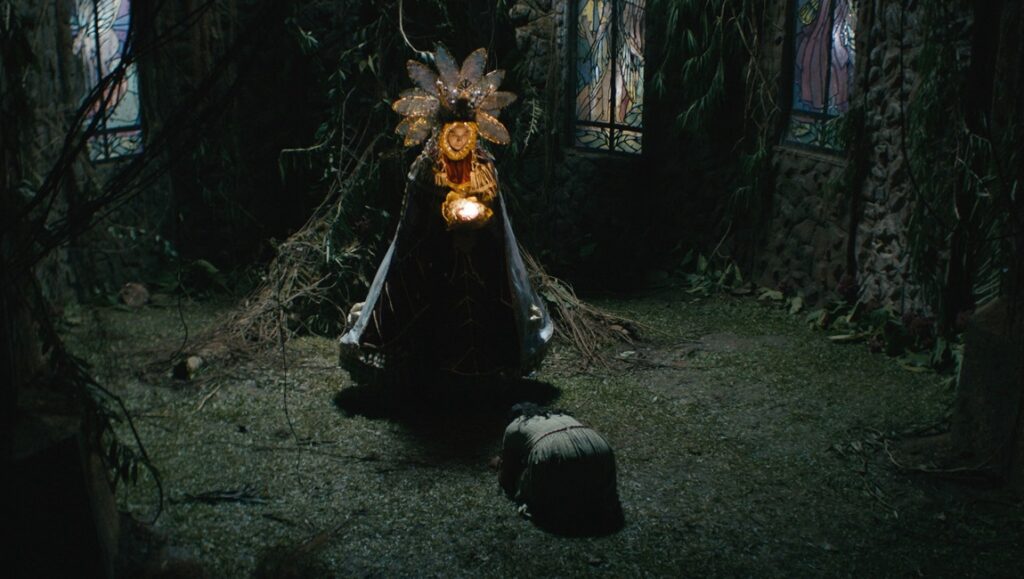Trapped in their luxurious mansion, a previously well-to-do family in the Philippines suffers through the tail-end of World War II, constantly being harassed by the Imperial Japanese Army. The patriarch, Aldo (Arnold Reyes), is rumored to have stolen gold bars from the Japanese, which has put Antonio (Ronnie Lazaro), a Filipino liaison to the kôgun, on their case. Although Aldo denies having stolen anything, he takes Antonio’s thinly veiled threats to heart and decides to leave his family behind in hopes of contacting the approaching Americans. Left alone, his wife Ligaya (Beauty Gonzales), daughter Tala (Felicity Kyle Napuli), son Bayani (James Mavie Estrella), and their scheming, live-in servant Amor (Angeli Bayani), are forced to fend for themselves, as the scarce rations put them on a steady diet of sweet potatoes for the next few weeks. When Ligaya suddenly falls ill, Tala and Bayani wander the surrounding forest, desperate to find help for their ailing mother. Chancing upon a dilapidated house, Tala comes across a fairy (Jasmine Curtis-Smith) who claims to possess a cure for the mother’s failing health.
Kenneth Dagatan’s creepy body horror fairytale is a beguiling genre amalgam which combines folkloric terror, historical tragedy, and shades of J-horror. When the fairy’s supposed miracle cure inevitably sets in motion a bizarre transformation, Ligaya’s body contorts uncomfortably, and her voice crackles with blood-curdling menace, recalling Kayako’s eerie death rattle in Ju-On: The Grudge. Obvious parallels to Guillermo del Toro’s Pan’s Labyrinth aside, In My Mother’s Skin grafts its more fantastical elements onto something altogether more nasty, even as it looks at the world through the innocent, naïve eyes of 14-year-old Tala. Mangled corpses and severed heads abound, punctuating — maybe “interrupting” is the more apt descriptor — the film’s deliberate pacing. There are kaleidoscopic shots of rich flora blossoming around the characters throughout the film’s 97 minutes, and their oneiric blurriness — reminiscent of Carlos Reygadas’ 2012 magical realist Post Tenebras Lux, as well as the works of Apichatpong Weerasethakul — counters the cold, sharp, gray interiors of the barren family manor.
Dagatan navigates the tonal and aesthetic back-and-forth with supreme confidence, easily seesawing between nightmarish folk horror and unambiguous brutality. Opening with the grim drudgery of life during wartime, the fairy’s arrival brings a sense of wonder and hope, at least at first. The fairy, golden-winged and gorgeous, glistens with magic and vague malevolence, the latter being completely invisible to the young protagonist. Once Tala invites the deceitful evil into her home, however, its true nature quickly becomes apparent, and the timid Ligaya’s transformation into a terrifying ghoul heralds Tala’s imminent loss of innocence as well. Interestingly, though, In My Mother’s Skin not only reflects on the war-induced loss of humanity but also on folk religion’s place in one of the most devoutly Catholic countries on earth. The family frequently prays in front of an altar upon which an effigy of the Virgin Mary stands. But as the grotesque curse grows stronger, sending Tala and her younger brother deeper into despair, their prayers fall on deaf ears: the gods of folklore reclaiming the land that was theirs before the Spanish converted the island nation to Christianity. “The Philippines is a very Catholic country,” elaborates Dagatan in an interview with Filmmaker Magazine. “I really wanted to provide a contrast to that hope of Catholicism.”
Consequently, In My Mother’s Skin is loaded with subversive imagery, most notably reflected in the design of Curtis-Smith’s fairy herself. Acting as an inversion of the saintly Mary, the fairy’s translucent halo transforms the warm glow associated with the light of Christianity into a perverse omen of doom, the golden wings not so much sacral as insectine. Dagatan elevates the mischievous mythical creature, then, into a symbol not only of the cannibalistic nature of war, but also a representation of the inevitability of loss, forcing Tala to confront mortality as a cruel and unavoidable thing — both the most essential and the most painful part of growing up.
DIRECTOR: Kenneth Dagatan; CAST: Beauty Gonzalez, Felicity Kyle Napuli, Jasmine Curtis-Smith, Angeli Bayani; DISTRIBUTOR: Amazon Studios; STREAMING: October 12; RUNTIME: 1 hr. 37 min.
Originally published as part of InRO Weekly — Volume 1, Issue 4.


Comments are closed.